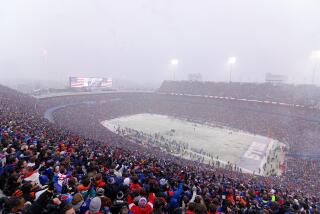Buffalo’s Long Drought Ends
- Share via
BUFFALO, N.Y. — In a city known for long, bitter winters, Buffalo sports fans finally can shelve the parkas and long johns, put away the shovels and snow-blowers, and prepare for something that’s not hit town in a very long time.
No, not spring. The playoffs.
The city’s postseason cold snap ended last week when the NHL’s Sabres clinched their first berth since 2001. The Bills are in a drought dating to the 1999 NFL season, a frustrating span in which they’ve enjoyed only one winning season.
Except for Columbus, whose Blue Jackets joined the NHL in 2000-01, no other North American city with a major-league franchise has gone that long without at least one of its teams reaching the playoffs.
Not a newcomer like Memphis, which has enjoyed two NBA playoff appearances since inheriting the once lowly Vancouver Grizzlies in 2001. Cleveland had the Browns in the NFL playoffs in 2002.
And it’s not the case even in one-sport towns such as Orlando, Fla., San Jose, and Jacksonville, Fla., or any of the six Canadian cities with major league franchises. Heck, in that time Boston has celebrated three Super Bowl championships and, in 2004, also cheered the Red Sox to their first World Series title in 86 years.
But Buffalo? Barely a playoff sniff until this year.
That’s unusual for a blue-collar city whose passionate fans got used to their teams not only making the playoffs but going deep in them. It started with the Jim Kelly-led Bills’ unprecedented four straight Super Bowl appearances in the early 1990s, and was capped by the Sabres reaching the Stanley Cup finals in 1999.
“It’s been painful,” said fan Pat Annese before a recent Sabres’ game. “I don’t think it makes the winters any shorter, but I think that it’s a civic pride thing. Everybody’s chest puffs up a little bit.”
The Bills and Sabres are woven into the fabric of western New York, a dwindling rust-belt region whose fragile economic health requires a certain amount of distraction that goes beyond a generous appetite for chicken wings.
It’s easier to debate starting quarterbacks or goaltenders than accept that Buffalo and Erie County are both in debt.
The weather doesn’t exactly help, either.
Playoffs, then, become the ultimate balm.
“It’s a hardworking, blue-collar town that lives and dies for their sports,” said Rob Ray, the former Sabres’ enforcer who now works as a TV broadcaster for the team. “And when they’re not in the playoffs, they kind of feel the rejection themselves, that people look at them as almost a second-class city.
“I think we get such a hard knock,” Ray added. “People just look for any way to make ourselves as a whole look better.”
Indianapolis Colt President Bill Polian knows what sports mean here on the shore of Lake Erie. He spent a decade in the Bills’ front office, and is credited for helping the team’s playoff success in the 1980s and ‘90s.
“A non-Buffalonian wouldn’t understand anything that we’re talking about until you understand the place the city’s sports teams hold in the hearts of western New Yorkers,” Polian said. “This is Green Bay East. This, in my way of thinking, is the greatest sports town in America.”
It might also be the most resilient, having overcome a rich history of postseason disappointment: From the Bills’ “Wide Right” and “Music City Miracle” (which in Buffalo is known as “The Immaculate Deception”), to the Sabres’ “No Goal” in the Dallas Stars’ Cup-clinching 1999 finals.
“Wide Right” refers to Scott Norwood missing a 47-yard field goal on the last play of Buffalo’s 20-19 loss to the Giants in the 1991 Super Bowl; the “Music City Miracle” occurred when the Tennessee Titans scored a game-winning touchdown on a last-second kickoff return in the 2000 AFC wild-card playoffs against the Bills, and “No Goal” was Brett Hull’s triple-overtime goal that was allowed despite replays showing the Dallas forward had his foot in the crease.
This Sabres’ team is a feel-good story, involving a franchise that overcame bankruptcy in 2003 and wasn’t expected to accomplish much this season with a relatively no-name roster and modest -- by NHL standards -- $30 million payroll.
With a 5-4 overtime win over the Ottawa Senators on Wednesday, the Sabres ranked fourth in the Eastern Conference and had won 47 games, two short of a franchise record and the most since winning 48 in 1983-84.
“It just tells you how far we’ve come through different challenges and problems,” Coach Lindy Ruff said. “I think we’ve surprised a lot of people.”
The Sabres’ playoff drought was the longest in their history. Before the drought, the team had missed the postseason just six times since joining the NHL in 1970-71.
Senator General Manager John Muckler spent seven years with the Sabres in the early 1990s -- missing the playoffs only once -- and still maintains a home in suburban Buffalo.
“I think there’s a little negativity in this town because they don’t look at themselves as winners,” Muckler said. “It’s doom and gloom, there’s no doubt about that. They need some sunlight.”


